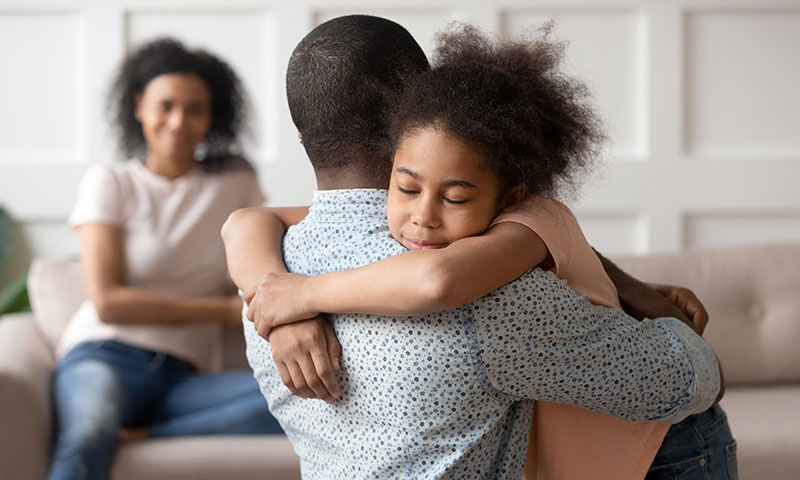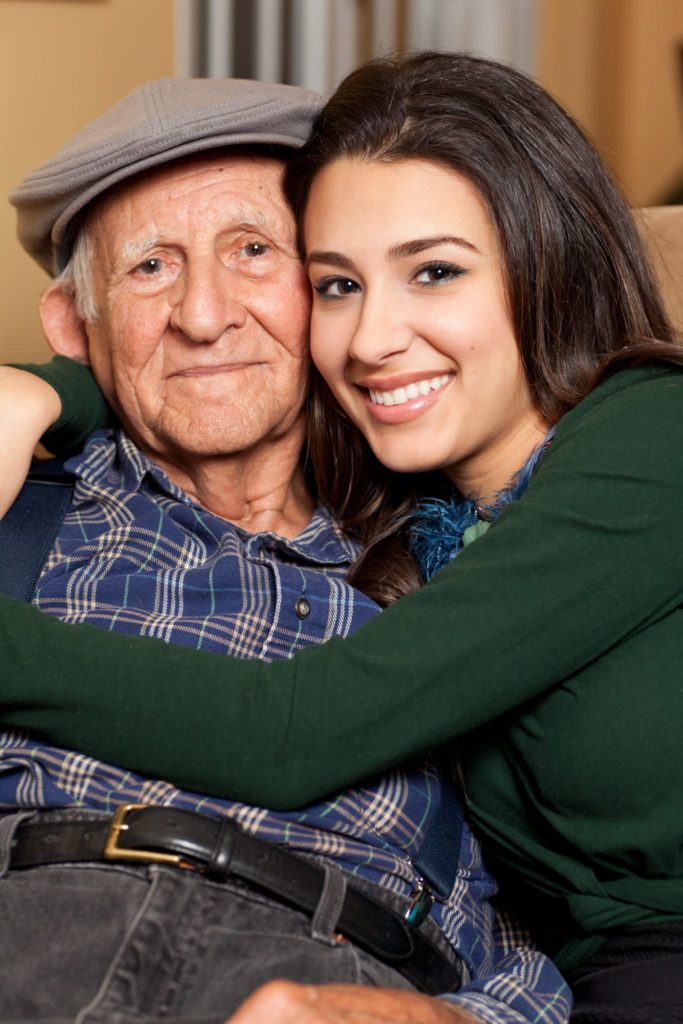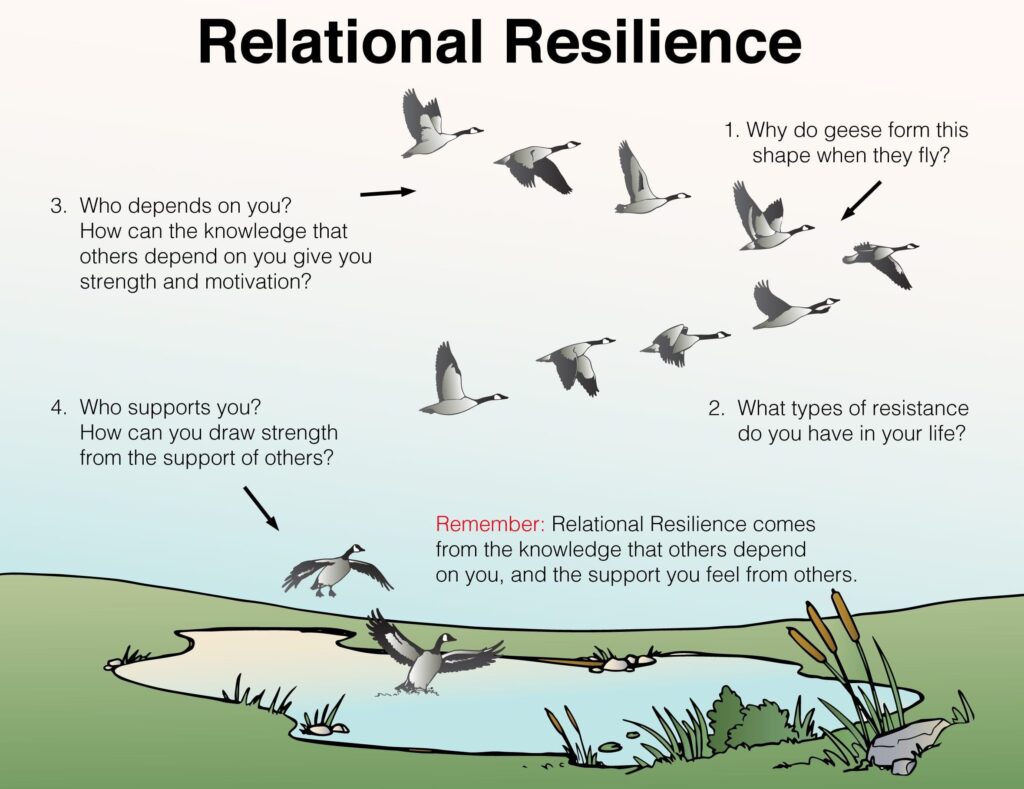Relational Resilience
What is Relational Resilience?
Relational Resilience: When you have Relational Resilience, you know people are depending on you. And you are depending on others. You draw strength from the emotional support of friends, family members, deceased loved ones, pets, or even a stranger who smiles your way.

Listen to this Chapter
They’re Depending on Me
Of all the sources of resilience, Relational Resilience perhaps resonates the most with parents. Just think about the way you handled challenges before you had kids as opposed to the way you handle them now. Chances are, you pull yourself up after a difficult event a lot more quickly now that you’re a parent. There is a person relying on you to do so. Parents often draw significant motivation from their child’s dependence on them – whether that motivation is to work, go back to school, prepare a meal, or simply get out of bed in the morning. Without knowing it, every parent who does something they wouldn’t have otherwise because of their child has Relational Resilience.
Parents often draw significant motivation from their children’s dependence on them – whether that motivation is to work, go back to school, prepare a meal, or simply get out of bed in the morning.
Relational Resilience is not just for parents – research demonstrates the importance of giving children meaningful roles for which they alone are responsible. This helps them feel like someone is depending on them, and it can improve behavior and increase resilience. Jobs that can help your child feel counted on include:
- Feeding or walking a pet
- Watering a plant
- Doing yard work
- Doing laundry
- Planning and preparing a meal once a week
- Taking over an aspect of care for younger siblings (like throwing away diapers, reading a bedtime story, or teaching a specific skill)
- Washing the dishes
- Helping a parent get information from the Internet, or giving other technological support

Make sure the job is something your child can do well and take ownership of, and see what happens to their dependability and resilience. Don’t forget to give lots of praise along the way!
Drawing Strength from the Support of Others
Think back to a moment in the last few weeks or months that made you particularly angry, stressed, anxious, or sad. How did you view those emotions? How did you deal with them? The second component of Relational Resilience is drawing strength from the support of others who care about you (or your children). Even if you’re a single parent, you’re not raising your children alone. Resilience can come as you seek out help from your parents or other family members, close friends, and the people who care about your child’s success: teachers, school counselors, coaches, doctors, religious leaders, after-school mentors, daycare workers, tutors, etc. When you can recognize the huge web of support that is in place to help you and your child succeed, being resilient in the face of challenges becomes much easier.

Using the support of others to bounce back from challenges is also an important part of Resource Resilience.
Turning Outward
The final ingredient in developing Relational Resilience is having the ability to turn outward.
What does it mean to turn outward?
Turning outward means taking notice of the needs and positive traits of the people around you and acting accordingly – Expressing gratitude and helping others when you see a need.
Helping your children find ways to turn outward will not only make them more resilient but will help them become better world citizens. It starts with your example. Some simple ways to turn outward include:
- Offer a sincere “thank you” to service workers who assist you: the bus driver, grocery store checker, crossing guard, etc.
- Help a mother with her arms full.
- Offer your seat on the train to a pregnant, disabled, or elderly person.
- Give directions to someone who is lost, even if you’re in a hurry.
- Say “I love you” to someone you love.
- Hold the door for someone.
- Shovel someone else’s sidewalk.
- Give sincere compliments to family members and friends.
- Say “Good morning” to the person next to you in the elevator.
- “Pay it forward” – When acts of kindness are directed toward you and your family, talk as a family about ways you can pay that kindness forward in your community.

Turning outward also means using your talents and expertise in ways that benefit others. If you or your children sing, you could perform at a local rest home. If you’re good at repairs, you could help an elderly neighbor with maintenance. While you shouldn’t take on more than you can handle, the act of turning outward in your home and community will bring more emotional benefits to you and your children than you ever thought possible.
Discussing Relational Resilience with Your Child
- Together, help your kids list off the people in their life who depend on them. Talk about how their decisions affect these people or groups.
- Together, help your kids list off the people in their life who support them. Discuss how that support can help them during difficult times.
- Talk about what it means to turn outward. Discuss how your kids have felt when they’ve served others. Talk about small ways you can turn outward or express gratitude: making another sibling’s bed, giving compliments, introducing yourself to someone who seems lonely, etc.

Reflection
In what areas of your life are you motivated by your child’s dependence on you? How do you think this dependence increases your resilience?

“We need to know that we are influencing others, and we need to feel the influence of others in our lives… It doesn’t matter if you are married or single, come from a huge family or are an only child whose parents have passed away. Connection to other human beings is vital to our ability to be resilient and thrive.“
